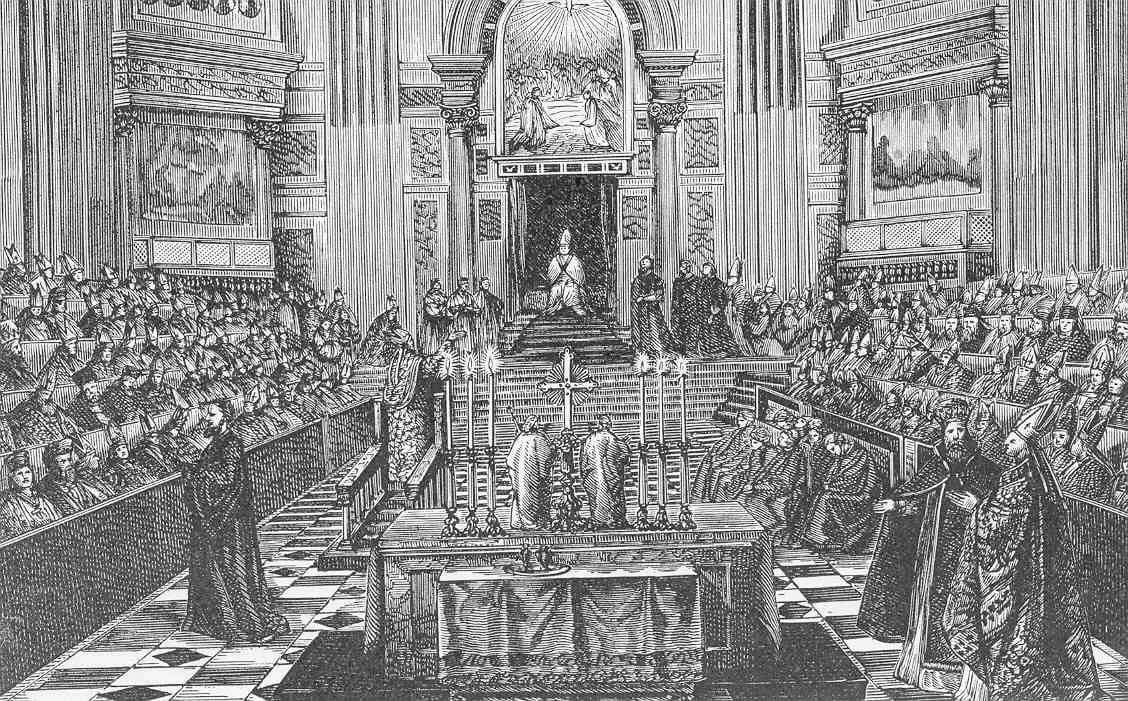This article was published in Vol. 3 No. 4 of our print edition.
In the bad old days of existing socialism—a misnomer for a shabby and idiotic totalitarian regime that thrived on the ruins of a derailed Enlightenment project—the official history of Christianity was conveniently divided into two main periods: The first was the progressive period. Jesus was depicted as a representative of the exploited and oppressed poor, and the early church as a model of solidarity and equality. The Gospel was, of course, never taken seriously, as its ethics prescribed love of the enemy and rejection of violent resistance; it was, after all, based on religious belief, an antipode of materialism. The second period began with the elevation of the church and the Christian confession to the status of a state religion by Emperor Constantine. Christianity quickly degenerated, according to the Enlightenment-inspired narrative of history, into a suppressive ideology that established the infamous alliance of throne and altar.
Of course, so the narrative went, anti-establishment movements also took Christian forms, but most of them were declared outright heretics and persecuted by the established church. Others, like the Franciscans, were more or less successfully integrated into the establishment. The most successful version of this anti-establishment impulse was Protestantism. However, Protestantism, too, was absorbed by reactionist elites and also became petrified social structures, so-called state churches, like the Anglican, Prussian Lutheran, or American Southern Baptist churches. The narrative ended with the prediction that all forms of Christian faith, along with established and non-established churches, would become obsolete, irrespective of any progressive content in them.
In non-communist Western European countries, as well as North America, where religious faith was not persecuted (the greatest exception having been Nazi Germany), this narrative was not imposed upon the curriculum in public education. On the contrary, a curious reconciliation between modernism and Christianity, epitomized by the Catholic aggiornamento, and expressed in a series of documents approved by the Second Vatican Council (1962–1965), took place. It looked as if the Catholic Church had acknowledged the truths and values of modernity, ingeniously redesigning itself for the upcoming democratic centuries and emancipating itself from the old feudal structures. Thus, without changing the doctrine and teaching, the Catholic faith seemed now to be at peace with freedom of conscience (and religion), with a positive evaluation of human sexuality more firmly tied to love rather than to mere procreation, with a rejection of all commitments to traditional social structures, and with a greater appreciation of the importance of the laity. Many even saw the signs of a new charismatic spirituality emerging, and the moral authority of the church becoming a universal compass for politics and economy alike. Although the Latin American Liberation Theology movement and its doctrines were considered excesses within the Catholic Church, they certainly contributed to a marked turn towards the poor and the exploited. Equality, solidarity, and social justice have been put on the banner of Catholic social teaching, placing obligations upon all the faithful, instead of accepting natural inequality, tending to the poor out of mercy, and outsourcing, as it were, charity activities (the Diakonia) to religious orders and other institutions led by clerics.
The reconciliation of the Catholic Church to modernity, accompanied by similar gestures by more traditional Protestant communities, did not yield the expected results. Although Pope John Paul II’s charismatic authority was unprecedented, it merely disguised the collapse of religious faith in the West, the details of which need to be rehearsed here. Churches are now empty and being sold, numbers of vocations have plunged, and trust in the clergy and the institutions of the church has been deeply shaken by the revelation of the sexual scandals. High church Protestantism hardly fares better, although new evangelical communities have emerged and recruited many disappointed members of the historical churches.
Those who remained in these churches are usually split over the causes of this collapse. Some blame the frozen and exclusivist clerical structures, the unfulfilled hopes for an even greater opening, and the hypocritical preaching of the church about poverty and solidarity, while it continues enjoying privileges, material well-being, and security. Others have a wildly different, essentially unreconcilable explanation. They point out that modernity, the heir to the Enlightenment project, was always essentially hostile to Christianity, and that it was a historical mistake for the church to seek peace, as it resulted only in appeasement and defeat.
Modernity has conquered the better part of Christianity, seduced its children, and poisoned its leadership, essentially the clergy. But it does not stop here, it is now relentlessly attacking the remaining true faithful. Non-conformist Christians are now persecuted, much as they were in the first three centuries, later by secular authorities even in Christian countries, less surprisingly in non-Christian ones (like Japan), violently during the French Revolution, and on an unprecedented scale by the communist and Nazi regimes. The new persecution is not violent—yet—but intimidating, intolerant, and no less malicious than its historical predecessors.
I do not intend to make a judgment over this bitter debate. My point is that this latter position and its arguments largely overlap with the political and moral criticism of conservatives on both sides of the Atlantic level against the so-called liberal hegemony. It is blamed for moral decay, excessive individualism, and the demolition of humanity by destroying traditional identities (male and female) and promoting new ones. The sanctuary of the family is now said to be being plundered, children indoctrinated, and non-compliant people harassed, more and more often by using the distorted judicial system. Many Christians who hold modernity culpable for the demise of the church and dispersion of the Christian flock join forces with political conservatism, seeing in it their natural political ally and representative, while conservative politicians look upon these groups—and many of their institutional leaders, bishops, evangelists, theologians—as reliable, strong, and loyal supporters.
I wish to argue, however, that Christians have several grave reasons to be wary of this alliance. They are mostly trivial and not at all new, yet tend to be neglected or outright ignored. Of course, being wary of conservatism as a Christian does not compel one to choose between being a conservative in politics and being a Christian. It does mean, however, being able to detach one’s conservative persuasion from the perspective of Christianity, the message of the Gospel, the followership of Christ as opposed to that of a political leader, however authentic and exemplary he or she might be, even as a Christian. Finally, detachment does not amount to voluntary schizophrenia, as it would be neither desirable nor, in fact, possible. Christian faith does and should inform our political convictions; historical and political experiences are often used as theological and theological–anthropological arguments. Nonetheless, it is possible to forget about the need for detachment, which threatens to falsify the Christian good news. Samuel Johnson is sometimes quoted by conservatives, with some malicious relish, as having said that ‘the first Whig was the devil’. Fair enough—but would Dr Johnson and his fans endorse the proposition that ‘the first Tory was Jesus Christ’?
Let me first state that classical conservatism has never been any sort of natural political representative of Christianity. Certainly, there is a point of agreement between them, and that is a pivotal one. Insofar as classical conservatism rejects politics being based on both rationalist principles, especially when they are derived from either certain materialist philosophies or from mystical political ‘truths’, for instance, about the nation and its ‘essence’ (the perennial seduction of Gnosticism), it is consistent with the original Christian approach to worldly affairs and concerns. This approach does not reject the necessity of there being governments (most importantly judges and law enforcers, rather than bureaucrats and professional lawmakers) but it recognizes their main rationale as constituted by a concept of the public good. This includes the protection of the basic moral commandments and their enforcement, the responsibility for maintaining peace and order, the provision of safety and security, as well as the basic goods and services necessary for individual and communal life.
‘Many Christians who hold modernity culpable for the demise of the church and dispersion of the Christian flock, join forces with political conservatism, seeing in it their natural political ally and representative’
With the rise of the Christian religion and the church in the West, this minimalist conception certainly changed, though obviously not in the primitive sense the Enlightenment narrative has it. Since most people were Christians, it seemed natural that governments ought to support Christianity (and promote it where necessary) and give privileges and immunities to the church, while the church should share political responsibility with governments. But such conceptions, which blossomed most fully in Protestant state churches rather than in Catholic countries, were difficult to reconcile with the implicit minimalism of the New Testament. Unsurprisingly, after some attempts to ground the ‘principles of the commonwealth’ in the books of the Hebrew Bible, political theory underwent a rapid secularization and came under the influence of various, and competing, philosophical theories. Thomas Hobbes’s political theory reflects his rationalist-geometric philosophy; John Locke’s more hesitant and wavering rationalism is closer to the old minimalist approach but, historically speaking, his foundational-constructivist method (we are all created free, equal, and rational agents, full stop) paved the way toward another type of contractualism, and Jean-Jacques Rousseau’s non-Christian anthropological conjectures led him not just to a new idea of the social contract but to a new (civil) religion.
Conservatives are usually fond of citing David Hume’s criticism of contract theories, as well as his organic-historical-conventionalist explanation of how governments arise. Hume’s anthropological views are certainly in stark opposition to those of Rousseau, Locke, and Hobbes, but they are also doubtlessly more relativistic and morally sceptical than the Christian conception of humanity. Thus, even if conservatives are right in considering Hume an important forerunner to classical conservatism, praising him both for his criticism of rationalist political theories and his sobriety in matters of good governing, they must acknowledge that Hume remains an outsider to Christianity, and his scepticism is directed as much against religion as against rationalism. In other words, Hume’s political essays (as he did not write a treatise comparable to the great classics of political philosophy) marked the birth of conservatism as a secular political philosophy.1 Notwithstanding the idea shared with Christianity about the government (rather than the polity) being at the centre of political theorizing, conservatism was born as a secular political conception.
Second, as conservatism is a secular political conception, it follows that it cannot but consider Christianity in terms of political and moral utility. It may be the case, as it has mostly been, that conservatives regard Christianity as having a positive political and moral value. James F. Stephen, the great opponent of John Stuart Mill, wrote that ‘it is desirable that legislators and their advisers should not legislate on the supposition that all sorts of conflicting creeds have an equal chance of being true, but should consider the question of the truth and falsehood of religious opinions’,2 but lest we should think of a new version of Inquisition, he continues to argue that the truths in question (belief in God and the afterlife, in particular) are beneficial, that is, without believing in them ‘life is a very much poorer and pettier thing; men are beings of much less importance; trouble, danger, and physical pain are much greater evils, and the prudence of virtue is much more questionable than has hitherto been supposed to be the case’.3 In other words, religious truth is conducive to a better life and better morals, or at least morals that operate tolerably well. Stephen does not think that anyone could bring himself to believe in any truth because it is conducive to a better life, for it is impossible to deliberately believe in something that we know, or guess, is not true. However, Stephen’s argument remains political and not philosophical or apologetic since he is concerned with the consequences of beliefs rather than with their veracity. And indeed, one of the main strengths of Conservatism has always been its capacity to foresee the political future.
There is nothing intrinsically wrong with political utilitarianism. The public-good-oriented Christian conception of governing endorses it, as both urge political leaders to consider the consequences of their decisions in terms of whether or not they are conducive to the public good. However, once moral aspects appear, and they do so routinely, there is a tendency in conservatism as a secular political conception to subsume morality under political expediency. Of course, many conservative thinkers honestly believed in the absolute validity of the Decalogue morality (excluding the first three commandments), but doing so is not an exclusively conservative feature. Liberals, socialists, anarchists, and republicans can believe no less honestly and earnestly in those prohibitions and commandments. Observing the foundational moral norms is not a matter of political ideology but of basic human decency and conscientiousness. Further, it is also true that each political ideology is liable to fall short of doing full service to morality. Liberals tend to conflate moral precepts with political ones, or reduce the complexity of morality to one or two principles. Marxists downplay the importance of morality for politics and think that the perfectly moral state of mankind is a matter for the utopian future. Critical theorists tend to think that morality is a mere disguise of power. Conservatives are apt to look upon morality as a means by which governing is easier since morality (pretty much regardless of its content) is essential for sustaining social cohesion.
‘There is no serious proposal on the table to restore the intellectual and spiritual authority of the church or the churches, let alone establish the Kingdom of God on earth’
However, from a Christian perspective, there is a serious problem with morality being absorbed into political utilitarianism. Whereas Christianity confirms the validity of the Decalogue—and more generally, of natural law—it also transcends it. It is impossible to govern consistently by following Jesus’s counsels, such as ‘do not to judge’ (Mt 7:1) or ‘neither do I condemn you’ (Jn 8:11). Of course, Jesus accepts legitimate secular authority, but resists identifying the law with (perfect) morality. He declares the Mosaic law about divorce as imperfect, and introduces a new norm that has become the prohibition (or more accurately the impossibility) of divorce in the Catholic Church, but whether, how, and to what extent this ‘perfectionist’ moral idea of marriage can be enforced in a secular or multi-religious society remains a contested issue. Those who set out to defend the concept of ‘traditional’ marriage often forget that Jesus’s conception of marriage was a markedly non-traditional one, precisely because he ignored the embeddedness of the then-traditional marriage in a broad social (and political) context, in which divorce was allowed, property issues predominated, patriarchal authority was unquestionable, and so on. His teaching of marriage was revolutionary, as it pointed to its transcendental meaning. In one sense, this was restorative (of God’s original intentions), but in another sense it uprooted the prevalent customs, potentially threatening social cohesion.4 A similar argument applies to the family, so often cited as the ‘basic unit of society’—true perhaps from a political utilitarian perspective, but hard to reconcile with the moral perfectionism of the Gospel, where the family is modelled according to shared divine love, rather than according to power, subjugation, idle obedience, mutual interests, the accumulation of wealth, dynastic considerations, and so on.
Third, although initially an anti-ideology, and a conception mostly committed to the public good and right governing, nineteenth-century conservatism has appropriated a wider scope of relevance. Due to the influence of Edmund Burke, Alexis de Tocqueville, as well as the more radical conservatives such as Joseph de Maistre, Louis de Bonald, and many more, it was transformed into a deep social and political philosophy. Again, there is nothing intrinsically wrong with this. However, no human philosophy, including conservatism, is capable of redeeming mankind. Today, transcendental perspectives on offer include transhumanism, Stoicism, naturalism (humans are no different from other species in terms of having no other intrinsic objective beyond survival), hedonism, or perhaps a more or less gentle, but merely dull, sort of nihilism—arguably, none of them is capable of doing justice to the fullness of human experience. However, even if conservatives tend to disparage these philosophies, for this very reason they cannot handle transcendental experiences either. They cannot incorporate God into their political philosophy, cannot promise hope, salvation, or happiness. But ever since conservatism has become more than a governmental philosophy, and has turned, perhaps because it had no other option, into a full-fledged worldview, in opposition to others such as liberalism, it is now able and tempted to present itself as an alternative to Christianity.5
To see how this is a problem, consider the widely used method of introducing political worldviews in terms of values. Conservatism is said to defend a particular set of values, as other ideologies do with their own sets of values. How should ‘defence’ be understood? In a classic political debate, this issue is a priority. Thus, in a classic debate on migration, a conservative may argue that security should be given priority over inclusion and solidarity. Conservatism does not have to deny the existence and validity of the value of either, but argues that under the circumstances, security is to be preferred.
However, once conservatism is understood as a wholesale moral and political worldview, the issue may become ontological on the one hand, and political on the other.6 The ontological aspects of the debate are raised by questioning the validity of values, and their very status as values (whether they are genuine or fake), whereas the political aspect arises once it is proposed that certain values, however valid, should (not) be imposed upon others. A conservative ontological assertion may be, for instance, to deny that inclusion or openness are genuine values in the first place (an outright denial of such values being real ones seems to be more appealing to radical rightist ideologies than to classic conservatism). Defending values also means attacking other values. Thus, conservatives may charge liberals for their ‘denial’ or ‘rejection’ of values such as the family, human life, or traditional communities, whatever ‘denial’ and ‘rejection’ entails. Liberals may retort that the conservative set of values contains a lot of garbage and distortion. Authority, hierarchy, and inequality are not values, they may argue, or if they are, they should be rejected in and by a modern, democratic, and free society. Once such ontological questions and debates enter politics, the rules of political debate apply. Some are intent on imposing their values upon others, others are in fear of having certain values imposed upon them. In the end, it is hard to see how and whether political debates, in themselves, can help us ascertain the validity or discern the true nature of values. To see this, it is sufficient to read the utterly unsuccessful attempt of Socrates to persuade Thrasymachus about the falsity of his concept of justice in a public debate.7
The problem is not that value discourses run along such lines. At least in the contemporary Western world, it is impossible to have a free public and political discourse without taking the risks of misunderstanding, distortion, philosophical absurdities, and inconsistencies. The problem is, rather, that if Christianity is too tightly linked up with the conservative rhetoric and the political method of discerning the meanings and ontological nature of values, it may lose its universal perspective and its unique conception of the world of values. In other words, Christianity is committed to the proposition that God’s whole creation is good, and whatever values there are in it are all valid and good. There is no Christian set of values, there are no Christian values. How values can be explored is a philosophical and theological issue; as a matter of fact, the many fine discussions of particular virtues Aquinas provided us with in the Summa Theologica are invaluable to every modern axiological theory. Christian reflection on values should be informed by theology and philosophy, rather than by political discourse, notwithstanding the merits of the latter.
As the fourth and final point, let me spell out an important difference between classical conservatism and what I have casually called the radical right above. The latter has been on the rise since the beginning of the new millennium. Initially, it looked like a more robust and self-confident version of conservatism, corroborated by the emergence of a new type of political leader and a new generation of right-wing politicians. Today, however, it is sufficiently clear that this new right is essentially different from conservatism. It appears fresh but is an heir to the radical rightist ideology that was popular in the interwar period. The reason why it strikes many—especially the young—as a more robust, lively, genuine version of conservatism is probably that the new right does not reject modernity; on the contrary, it embraces it. This was also typical for the old version of radical rightism (and also, as it were, for its very first edition, the revolutionary reactionarism that followed the Napoleonic Wars).
Of course, modernity is a very broad term, but for the present purposes, it suffices to recall three of its many important features. First, modernity is closely related to democracy, the age of equality and liberty, with equality to be given priority over liberty, if necessary. Second, modernity is also constituted by capitalism, the free exchange of goods and services, and the ensuing social and physical mobility of many people. Capitalism has secured unprecedented material wealth for millions, if not billions of people within two centuries, producing, thirdly, a demographic change unprecedented in the history of humankind. In addition, democracy gave political rights to these masses. These developments have been dramatic by any standards.
As we learn from the history of ideas and ideologies, these changes were as much welcome and embraced as feared and rejected. In the nineteenth century, both liberals and conservatives tried hard to master these cataclysmic transformations, with liberals tending to be less and conservatives more worried and cautious. Conservatives, for instance, warned that without sufficient embourgeoisement, education, moral virtues, etc., democracy would turn against itself and become a tyranny of the manipulable majority. Likewise, letting loose the gigantic forces of capitalism would create class antagonisms, hatred, as well as fear of change, and insecurity. The world wars, the unspeakable horrors of racism, nationalism, communism, and the totalitarian regimes of the twentieth century testified to the reality of these perils.
The conservative argument for moderation and caution was sound but mostly futile. It either fell on deaf ears or it appeared weak: regrettably, we are apt to neglect calls for moderation, both in our individual lives and in our collective endeavours. Aurel Kolnai, certainly one of the best conservative thinkers of the twentieth century, recalls from his young years the amusing, muttered words of his famous college teacher, the renowned mathematician László Rácz, to his pupils, already political zealots: ‘Want to reform society…set up a new social order…create the world anew…redeem mankind…can’t cope with a function of the fourth degree’.8 Benevolent but impatient anarchists and populists, socialists and radical reformers, Christian zealots and freemasonry activists cried out action, fabricated new principles and theories, and once given a chance, rushed to implement them by the formidable means and weapons of the modern state.
Some conservatives or conservative-minded politicians and thinkers have succumbed to the allure of radical thought and action. Inevitably, they were compelled to abandon their conservative qualms and reservations and embrace the new world of democracy. What made this easier for them to do was that they could preserve their misgivings about capitalism, and eventually turn them into hatred. This is how the European new right emerged after the First World War and the Great Depression, and seems to have gained new impetus after the 2008 Global Financial Crisis. Their American counterparts, also formed in the twentieth century, but having gained substantial influence over the right-wing electorate only recently, followed a different track, emphasizing and celebrating capitalism as a component of American identity. However, they are overcompensating for this with an even greater dose of fervour when it comes to worshipping the will of the people. Thus, the new right, having abandoned classic conservatism and its preoccupation with how to govern amid waves of immoderation, mass passions, inordinate ideological fashions, and all other sorts of imbalances, embraces modernity wholeheartedly. It combats the alleged liberal hegemony less to rectify politics and more to replace it with new-old hegemonic concepts, usually those of the nation, sometimes the people, or Western civilization, but rarely with Christianity.
There is no serious proposal on the table to restore the intellectual and spiritual authority of the church or the churches, let alone establish the Kingdom of God on earth. This (especially the latter) is highly welcome self-restraint from a Christian point of view. However, substituting, for instance, the nation for the abstract individual as the highest conceivable authority by no means creates a more favourable environment for the Christian message. On the contrary: the idolatry inherent to all political religions, including that of the nation, the people, the sovereign, or the Empty Throne,9 is a perennial seduction to convert Christians to the cause of Caesar and betray Jesus, the Christ.
NOTES
1 David Hume, ‘On the First Principles of Government’ and ‘The Origins of Government’, in Eugene F. Miller, ed., Essays Moral, Political, Literary (Indianapolis: Liberty Fund, 1987), 32–42.
2 James F. Stephen, Liberty, Equality, Fraternity (Indianapolis: Liberty Fund, 1993), 46.
3 Stephen, Liberty, Equality, Fraternity, 47.
4 This possibility became an explicit charge made by Roman authorities, as the new faith was often perceived as potentially destructive of existing family bonds and relations, creating in their place new, publicly invisible communities. St Paul’s letters testify to his efforts to characterize Christian families as perfectly normal and visible—that is, corresponding to broader societal and moral norms. However, his extolling of the relationship between Christ and the church as bride and groom was surely revolutionary in both directions: for ecclesiology and the sacramental understanding of marriage.
5 As far as I can see, the most transcendence-conscious conservative conceptions lean either toward Stoicism or some aesthetic hedonism. See the works of George Santayana, Roger Scruton, and John Kekes. The nature of Scruton’s relationship to religion is a difficult issue, as he was far from being a confessor of Christian faith; the atheisms of Santayana and Kekes are non-negotiable facts.
6 Carl Schmitt makes a similar point, commenting on Nikolai Hartmann’s observation that much talk about values is a facade for the ‘old and endless struggle between convictions and interests’. Carl Schmitt, The Tyranny of Values (Washington: Plutarch Press, 1996), 25.
7 Plato, The Republic, transl. by R. Waterfield (Oxford– New York: Oxford University Press, 1993).
8 Aurel Kolnai, Political Memoirs (Lexington Books, 1999).
9 Giorgio Agamben recovered this antique concept for the purpose of using it in modern political theology. Though he does not by any means advance a conservative position, and is suspicious of liberalism as well, his genealogical studies are invaluable for unmasking the hollowness of modern political sovereignty (hence the image of the Empty Throne). See Giorgio Agamben, The Kingdom and the Glory (Stanford University Press, 2011).








